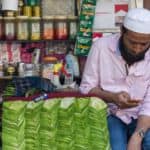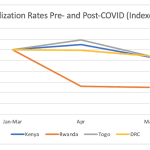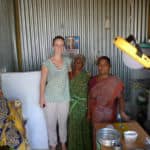An Innovative Approach to Income Volatility: How One Company Is Bringing Income Pooling (Back) to the United States
The summer after my freshman year at the University of Texas, I interned with a USAID-funded maternal and neonatal project in my parents’ home country of Pakistan. While visiting one of our rural maternal health sites, I came across a practice called “committee dhalna.” Every month, a group of individuals (usually women), families or business owners would contribute a portion of their income to a community pool; the pool then donated the entirety of the proceeds to a single participant. This enabled members of the group to recover after an income shock or make much-needed expenditures such as purchasing medicine, repairing their roofs and paying for their children’s tuition. An internal committee decided each month’s recipient by considering individuals’ needs and the last time they received a distribution. This helped mitigate any misgivings or feelings of jealousy.
The practice of committee dhalna didn’t surprise me. In Pakistan, a single household often includes multiple nuclear families and spans across generations. It is not uncommon for two siblings to jointly raise their families in a house they purchased together — and for better or for worse, financial and personal decisions within these households are made jointly and with everyone’s input. Though these familial obligations can be a source of disagreement, they also offer security. Those who are sick or are struggling to find a job can lean on their family for financial and emotional support.
I assumed committee dhalna was unique to Pakistan, but as my work took me to the Middle East, Southeast Asia and sub-Saharan Africa, I found that it was nearly universal. Populations in emerging markets have long withstood income volatility by adopting practices similar to committee dhalna, or developing cultural norms promoting joint families and multi-generational living. Interestingly though, this concept seems foreign in the United States. Broadly speaking, Americans do not feel comfortable with the idea of income pooling — in my assessment, because it conflicts with our nation’s unique ethos of individualism.
However, this hasn’t always been the case. Throughout our country’s history, religious institutions, unions and immigrant groups have all adopted their own version of income pooling. In recent decades, of course, Americans have largely stopped participating in civic groups, unionization rates have declined, and fewer and fewer attend religious services. We’re becoming a nation not of rugged individualists, but of isolated individual workers. Meanwhile, the concurrent rise of income inequality and volatility is leaving an ever-increasing number of Americans vulnerable to economic shock.
The company I now work for, Pando, seeks to mitigate income volatility by creating, organizing and managing income pools. These are legal agreements in which individuals in careers with a high degree of income volatility commit to contributing a percentage of their annual income to a communal pool — but only if they earn above an agreed-upon threshold. Every year, money from this pool is distributed evenly to everyone in the pool, helping those experiencing income volatility and low earnings. In exchange for a portion of all distributions, Pando administers and manages these pools by analyzing poolers’ incomes, collecting money from those who have cleared the threshold and distributing the pooled money to the participants.
Those who participate in our pools benefit not just financially but also professionally and socially. We have seen our customers turn to their pools to expand their network, get feedback on pressing financial issues and collaborate on new ideas. Just as the committee dhalna binds a village together, our pools provide a community to our customers.
For our current product to attract customers and work, those contributing their income must part with a relatively small portion of their income, while recipients must receive enough income to meaningfully reduce their volatility. Such economics only work in so-called “superstar” industries — like entrepreneurship and sports — in which a few individuals enjoy runaway success but the rest achieve middling outcomes. Well-established entrepreneurs and athletes may not need our help, but most startups fail, and most professional athletes are cut or injured before they see a major payday. By joining a pool at the beginning of their careers, participants in these industries can reduce not only their income volatility but also their risk.
However, the vast majority of Americans do not work in these superstar industries, and Pando will need to explore new products if it hopes to serve a broader range of individuals. Our ultimate hope is to improve financial outcomes for low-income and marginalized populations — like the ones currently served by institutions like committee dhalna in Pakistan. To that end, we’re open to exploring partnerships with organizations and government agencies which have experience implementing poverty alleviation and economic development programs.
When I explain Pando to my family and to friends with similar immigrant roots, they immediately understand it. Many have heard of or practiced something similar “back home.” In international development, ideas, frameworks and technologies have historically flowed from the developing world to emerging markets. But much like mobile money, Pando is a perfect example of how countries like the United States can draw inspiration from the developing world to address long-standing problems in our own backyard.
Sarmed Rashid is Head of Strategy, Growth and Special Projects at Pando.
Photo: A women self-help group in Pakistan. Credit: Digni Norge.
- Categories
- Finance



